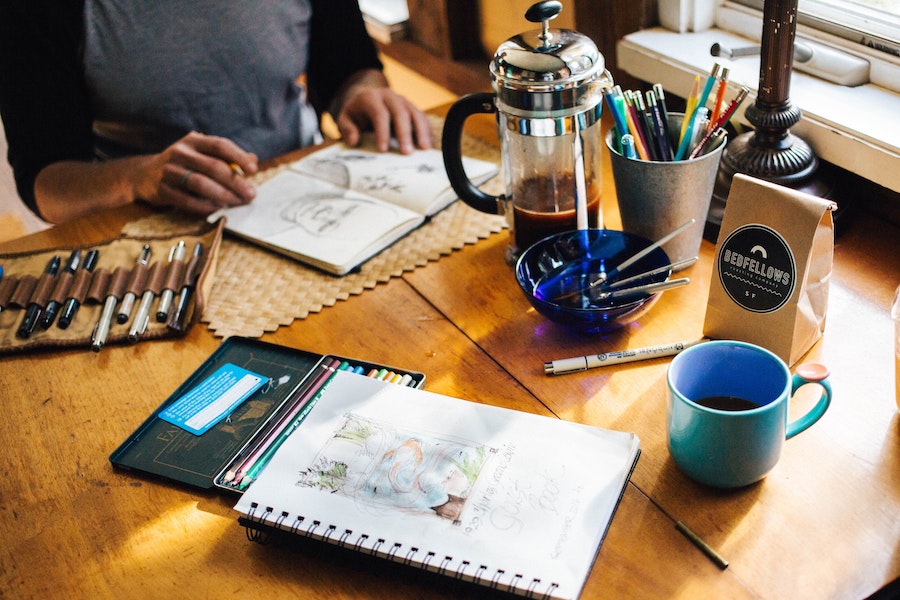
As a career and life coach, I’ve noticed how people’s priorities have changed over the course of this year. As well as a shift in relationships, interests and lifestyle, what I’m seeing is that many of you are now seeing you can change how you work.
Some are planning to start their own businesses, others are cutting back their hours, a few are preparing for a career change and almost all are thinking about how they can create a more balanced approach to work and life.
Your job is important but you don’t want it to become your entire world. Making time for outside interests, prioritising relationships and having boundaries between work and life are imperative to maintaining a sense of wellbeing.
1. Set boundaries between work and life
When you work from home it’s easy to blur the lines. It might be tempting (and even sometimes necessary) to jump back online after dinner but before you make a habit of this, think about how you’d ideally like to structure your days and weeks.
Working from home can be great for flexibility if it means you can get out for a walk during the day or share the homeschooling with your partner, but it can also mean feeling constantly ‘on’.
Create some personal rules about how many hours you’ll work each day and establish a time to switch off at night. Ideally, set aside a couple of days each week to completely disengage from work tasks and to take a break from your email.
If you don’t have the luxury of a separate workspace in your home, clear away your work things as a way of marking the end of your day.
2. Unplug sometimes
After recently watching the documentary The Social Dilemma, Chris and I have decided to be much more vigilant about our time online. We didn’t need the film to tell us how addictive our devices are, but it reminded us that it’s easy to let technology take over our lives.
Switch off as many notifications as you can and make a commitment to have certain periods of your day offline. You may like to try one ‘screen-free day’ every week and observe the difference this makes.
Allowing downtime gives you a greater opportunity to connect with yourself and the people around you as well as the chance to properly decompress.
3. Prioritise your health
Our mental, emotional and physical wellbeing should be our number one priority at all times.
If you’re predisposed to anxiety or low-mood, make sure you have support measures in place, particularly while you’re isolated from friends and family. Choose activities that genuinely restore your wellbeing and ideally, create a sense of routine around these habits.
Try not to be overly prescriptive about what constitutes healthy living – instead, consider a few ways that you can enjoy moving your life in the direction of greater wellbeing, rather than away from it.
Meditate upon waking. Get up from your desk and move or stretch on a regular basis. Finish work early to join an online exercise class. Set up a regular appointment with a psychologist or career coach for mental support.
4. Improve your relationships
When we let work take over our lives, our relationships generally suffer. Even the connections with colleagues can become strained when our sole intent is on driving results.
Take a step back and reflect on the most important relationships inside and outside your workplace. Are you making time to genuinely connect with those people? And if yes, are you being mindful in how you interact with them, taking personal differences into account?
One simple way to improve your relationships is to become a better listener. Tune in to what the other person is really saying, be curious about their point of view and ask a few questions before jumping in with your thoughts.
5. Play to your strengths to change how you work
In many workplaces, the focus is on trying to overcome weaknesses. One way to change how we work is to reverse this focus and build on our strengths, career and life satisfaction are likely to improve.
Your strengths are the characteristics and abilities that help you to perform at your best and overcome adversity. Each of us possess character strengths, which Positive Psychology groups under the six virtues of wisdom, courage, humanity, justice, temperance, and transcendence. Your particular collection of strengths is what makes you unique.
Research has found that when we play to our strengths we feel happier, we’re more confident, we perform our roles more effectively, and we are more inclined to find more meaning in our work.
Identify your strengths by observing the activities you enjoy and the things you do well naturally. Sometimes we downplay our innate strengths because it feels almost effortless to use them.
Take the free Positive Psychology VIA Character Strengths Survey to learn about your natural strengths and aim to engage your top strengths more regularly in your everyday.
6. Become more mindful with money
Often when we become aware of economic uncertainty in the wider world, we begin to pay more attention to our personal financial wellbeing. Taking good care of your finances will help you to feel that you have more control of your future and in turn, this sense of security will give you more freedom and choice about how and where you work.
If you feel you’ve been somewhat neglectful in your financial planning to date, now is a great time to start.
Set up a simple budget or establish a savings plan that supports the achievement of your longer-term goals.
If you feel overwhelmed about where to begin, grab a copy of Scott Pape’s Barefoot Investor.
7. Take your annual leave
A recent survey found that Australians currently have the highest level of accrued annual leave since 2012. Which means we’re missing the regular breaks that give us the chance to properly unwind and change how we work.
While overseas trips are off the agenda right now, a short stay-at-home break can be a great way to relax and replenish.
Set aside a few hours to plan your leave for the coming twelve months. You might like to include a few extended weekends for home-based vacations as well as longer breaks once or twice every year. If you can’t yet put dates to your dreams or made bookings because of COVID or work considerations, it will still be rejuvenating to plan what you’d like to do during your breaks.
Research has found that planning and researching your holidays have a positive impact on your wellbeing – even before you head away.

